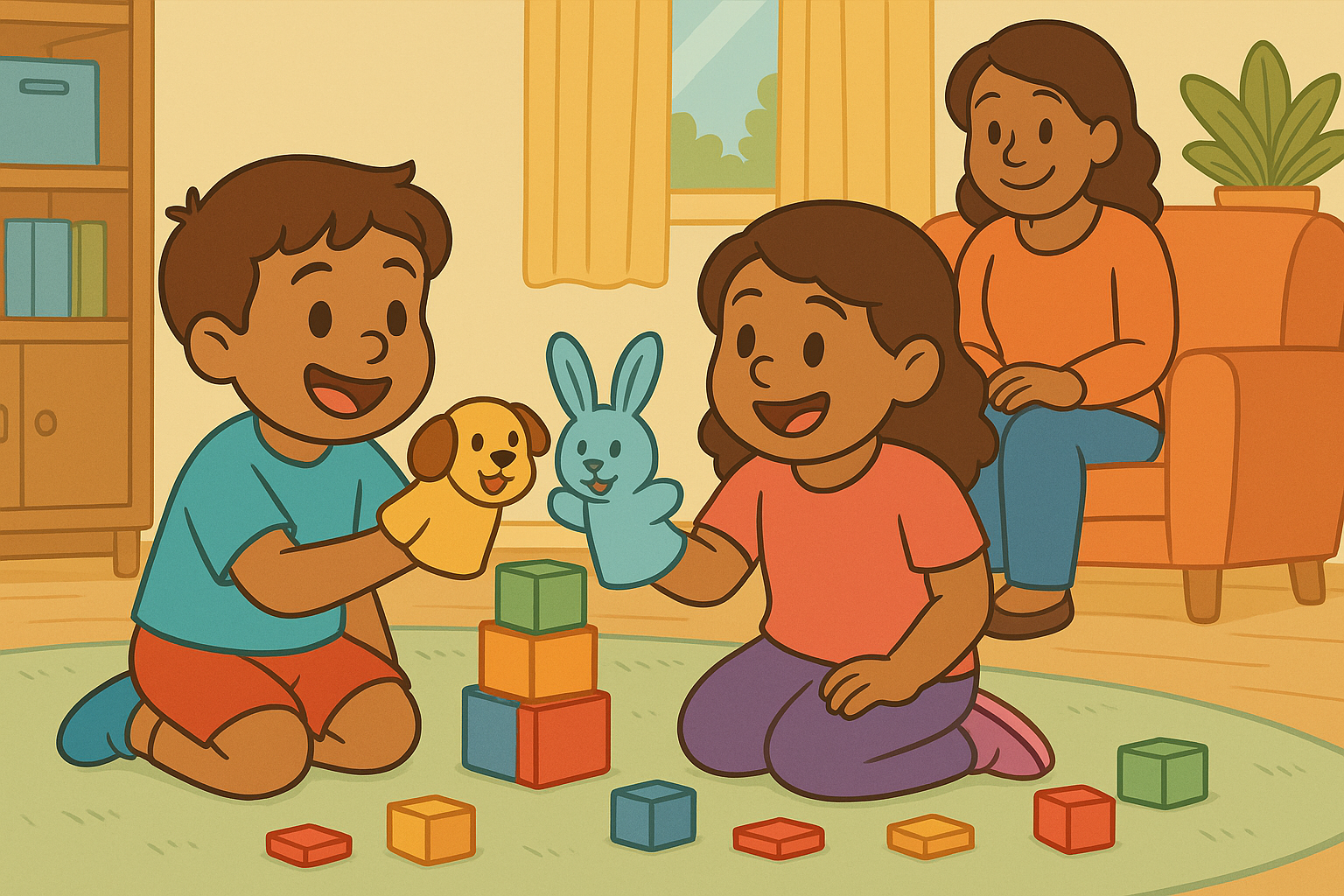Encouraging Peer Learning During Playdates
Encouraging Peer Learning During Playdates
Why Playdates Are Powerful Learning Moments
When young children play together, they’re doing much more than laughing and sharing toys. They’re practicing communication, problem-solving, emotion regulation, negotiation, and cooperative learning — skills that are cornerstones of classroom success.
Peer learning during playdates helps children:
Observe new play strategies
Try language they’ve heard from others
Practice turn-taking and fairness
Learn flexible thinking
When kids learn with each other, it feels natural, joyful, and meaningful.
(Related read: Teaching Patience and Focus Through Turn-Based Play)
The Science Behind Learning From Peers
Children often learn best when watching other children. That’s because peer modeling activates:
Mirror neurons (copying actions, emotions, language)
Motivation (“I want to try that too!”)
Social awareness (noticing feelings, tone, body language)
Teachers see this every day in preschool classrooms — you can encourage the same dynamic right at home.
(Also read: Encouraging Confidence in Early Readers)
Step 1: Set Up Your Space for Collaborative Play
Create an environment that encourages side-by-side exploration rather than competition.
A few easy ideas:
Blocks & building: Encourage joint structures
Open-ended sensory bins: Rice, scoops, funnels, animal figurines
Art stations: Shared crayons, stickers, stamps
Place materials between the children so they naturally take turns and share.
Step 2: Choose Activities That Welcome Multiple Ideas
The best peer-learning activities don’t have a “right way” — they evolve based on creativity:
Puppet shows
Dramatic pretend play (restaurant, vet, bakery)
“Build a city” with blocks and vehicles
Loose-parts play (bells, lids, pinecones, ribbon)
These spark imagination and negotiation (Who will be the chef? Where should the road go?).
Step 3: Stay Nearby — But Don’t Lead
Adults can support peer learning by being present, observant, and calm — without steering the play.
Try to:
Narrate gently (“You both have ideas!”)
Ask open-ended questions
Let children problem-solve first
Avoid jumping in too quickly; conflict resolution is where so much learning happens.
(Try this: The Importance of Open-Ended Questions in Learning)
Step 4: Offer Gentle Scripts to Support Social Language
Young children often need help finding the words they haven’t learned yet.
You can model phrases like:
“Can I have a turn when you’re done?”
“Let’s do it together!”
“Can we trade?”
Place these on your fridge or toy shelf as reminders — repetition builds confidence.
Step 5: Encourage Turn-Taking Games
Turn-based play teaches:
Impulse control
Patience
Rule-following
Social awareness
Great options:
Board games with simple rules
Rolling a ball back and forth
Taking turns adding pieces to a tower
When the playdate ends, skills remain.
Step 6: Highlight Cooperation, Not Competition
Children thrive when success is shared.
Say:
“You worked together to make that tower tall!”
Avoid:
“Who did it best?”
or
“Who won?” (Especially under age 5)
Collaboration builds empathy and positive feelings toward peers.
Step 7: Invite Kids to Teach Each Other
Peer teaching is incredibly powerful.
Try:
“Can you show your friend how to use the droppers?”
“You’re great at building ramps — want to teach them?”
Teaching strengthens:
Confidence
Communication
Mastery of concepts
(Try this too: Encouraging Independent Learning Through Choice)
Step 8: Debrief After the Playdate
Reflection deepens learning.
Ask:
“What did you enjoy doing with your friend?”
“What did you learn from them?”
“What should we try next time?”
This helps children internalize social lessons — and feel good about connection.
Handling Conflict (Without Ruining the Fun)
Conflict is not failure — it’s practice.
If tensions rise:
Stay calm and neutral
Narrate feelings: “It looks like you both want the same truck.”
Offer tools: “We can take turns or find another role.”
Avoid blaming. Model empathy.
Kids learn lifelong social strategies through these micro-moments.
(See also: The Power of Positive Reinforcement in Early Learning)
When Children Feel Shy or Overwhelmed
Normalize it.
Say:
“It’s okay to watch for a while. You can join when you’re ready.”
Offer parallel play options:
Coloring side-by-side
Building separately but nearby
Children warm up at different speeds.
Fuzzigram’s Favorite Peer-Learning Ideas
Build a shared block city
Collaborative art mural
Shared sensory bin adventure
Puppet show storytelling
“Restaurant” dramatic play
This content is for educational purposes and is not a substitute for professional medical or psychological advice.
Popular Parenting Articles




